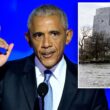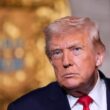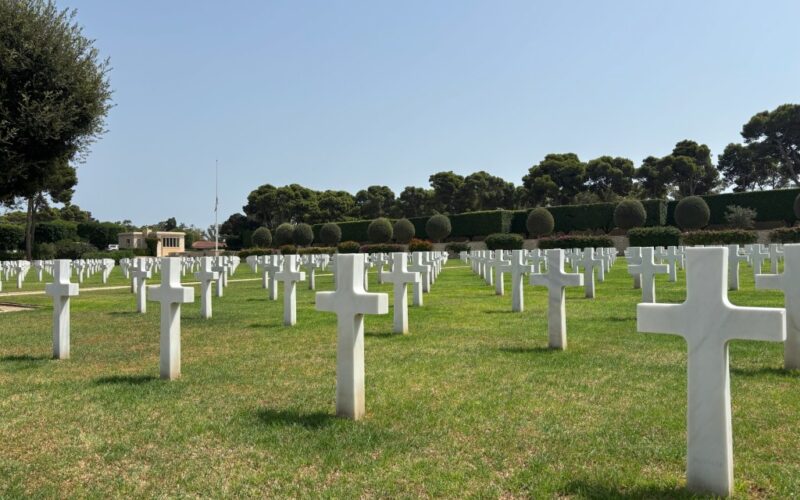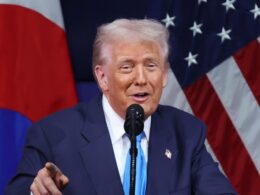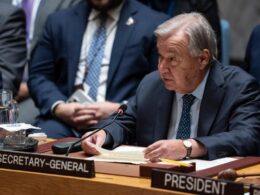At the end of August recess, I had the privilege of leading a bipartisan congressional delegation (CODEL) to Italy, Vatican City, Tunisia and Morocco. The purpose of our trip was clear: to strengthen America’s partnerships in the Mediterranean and North Africa, confront the threats posed by adversaries like China, Russia, and Iran, and reaffirm our leadership in promoting freedom and stability abroad.
We began in Naples, Italy, where we met with the U.S. Navy’s Sixth Fleet, the linchpin of American security operations in the Mediterranean. From countering Russian aggression to safeguarding critical shipping routes, their work is vital. I was especially proud to meet with sailors from New York, young men and women serving thousands of miles from home, who embody the very best of our country.
I couldn’t help but think of their families back home, the parents, spouses, and children who sacrifice quietly while their loved ones stand watch overseas. The sailors’ stories reminded me that America’s defense is not abstract; it’s highly personal, and it’s lived every day by our district’s families and servicemembers.
From Naples, we traveled to the Vatican, where we were granted a private audience with His Holiness Pope Leo XIV. For me, as the great-grandson of Irish and Italian immigrants and a practicing Catholic, it was an experience both humbling and incredibly moving. We spoke about the challenges facing religious minorities across North Africa, the Middle East, and China, about America’s unique role in protecting freedom of conscience, and about the moral duty of great nations to safeguard the vulnerable.
It’s a visit I’ll never forget.
From Italy, we traveled to Tunisia, where we met with senior government officials to discuss trade and investment opportunities, our strong military cooperation, the challenges within the U.S.-Tunisia relationship, and the current situation in Libya. We had the solemn honor of laying a wreath at the North Africa American Cemetery, where thousands of American servicemembers who gave their lives in World War II are buried.
Walking among the white headstones of thousands of Americans who never came home, we laid a wreath in solemn tribute. I thought of my own neighbors and friends who wear the uniform today, especially of those we’d just met in Naples. Our leadership on the world stage isn’t just about policies on paper. It’s written in the courage and sacrifice of those who came before us, and we dishonor that sacrifice if we turn away from the responsibilities they carried.
We concluded our CODEL in Morocco, the first country to recognize the United States in 1777. Morocco has played a pivotal role in the region by normalizing relations with Israel, engaging in strong military cooperation with the U.S., exporting security to other African countries, and implementing the autonomy plan over Western Sahara. Morocco has been a consistent and trusted partner, and deepening this alliance is crucial as we face threats not only in the Middle East but also across North Africa.
The resounding message from this trip is simple: America cannot retreat from the world. Everywhere, our allies are looking to us for leadership and example, and our adversaries are watching for weakness. By engaging directly with partners, reaffirming our commitments, and ensuring our servicemembers have the tools they need, we send a clear message: America will always stand for peace, freedom, and security.
For the people of New York’s Hudson Valley, this work may seem far from home, but the consequences are not. Global trade flows through these regions. The alliances we strengthen abroad directly affect our safety, our economy, and our way of life here at home.
I will continue to work across the aisle to ensure America leads with strength, builds enduring partnerships, and never falters in defending freedom. That is how we secure peace abroad and security here at home.
Now back in D.C. for another session of Congress, what stays with me most are not the formal meetings or policy briefings, but the human moments in between — the conversations with sailors longing for home, the stillness of the cemetery at dusk, the history that echoes through the streets of Italy, and the enduring friendship with Morocco that dates back to our Revolution. These are the moments that give weight to our work. They remind us that diplomacy is not just about strategy or documents; it is about people.
Lawler represents New York’s 17th District congressional district and serves on the House Foreign Affairs Committee as chairman of its Middle East and North Africa Subcommittee.
